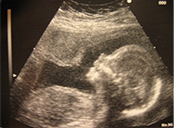Antenatal Care
During the special period that is your pregnancy, we as healthcare professionals are here to provide you with all the help and support you might need. Regular check-ups to monitor you and your child’s health and development are essential to treat and/or prevent problems that might occur.
Types of Scans
Viability Scan
Conducted around 6 - 8 weeks of pregnancy, this ultrasound is performed to determine early pregnancy, the number of fetuses and gestational age, as well as the expected date of delivery. This scan is also used to exclude ectopic pregnancies.
Screening Scan
Conducted around 20 - 22 weeks of pregnancy. This fetal anomaly screening scan is performed to analyse the structural anatomy of the fetus and to screen for any structural anomalies. At this stage, the placental location, amount of amniotic fluid and the growth of the fetus is analysed.
Growth Scan
Conducted around 30 - 32 weeks of pregnancy. The growth scan is performed to assess the fetus' growth trend, evaluate the placental location prior to childbirth, to ensure a healthy volume of amniotic fluid is present and to observe the fetal movement. Coloured doppler ultrasound is also used to ensure optimum and healthy blood flow to the baby.
Types of Tests
FTPS or OSCAR (One-Stop Clinic for Assessment of Risks of Fetal Anomalies)
Conducted between 11 - 13 weeks of pregnancy, this non-invasive test combines a high-resolution ultrasound scan with maternal blood screening to estimate the probability risks of Down syndrome.
NIPT (Non-invasive Prenatal Testing)
NIPT is performed using a simple blood test from the mother containing pieces of her foetus' DNA, to screen pregnancies for the likelihood of common chromosomal anomalies – trisomy 21 (Down syndrome), 18 (Edwards syndrome) and 13 (Patau syndrome).
Amniocentesis
Conducted around 16 - 20 weeks of pregnancy, this process involves using a needle to extract a small amount of the amniotic fluid surrounding the foetus, for the prenatal diagnosis of chromosomal anomalies. While this is a safe and quick procedure, it is an invasive process that involves a 0.5% risk of miscarriage.
CVS (Chorionic Villus Sampling)
Conducted around 10 - 14 weeks of pregnancy, this procedure involves the extraction of a small amount of placenta tissue to detect chromosomal and genetic anomalies. While this is a safe and quick procedure, it is an invasive process that involves a 1-2 % risk of miscarriage.
Modes of Delivery
Normal / Assisted or Instrumental / Caesarean Section
While the most common mode is a vaginal delivery, some women might require the additional assistance of forceps or a vacuum cup. In other cases, a caesarean section might be the best mode of delivery. Depending on the individual, each mode of delivery comes with its own set of risks and benefits.
 During the special period that is your pregnancy, we as healthcare professionals are here to provide you with all the help and support you might need. Regular check-ups to monitor you and your child’s health and development are essential to treat and/or prevent problems that might occur.
During the special period that is your pregnancy, we as healthcare professionals are here to provide you with all the help and support you might need. Regular check-ups to monitor you and your child’s health and development are essential to treat and/or prevent problems that might occur.

